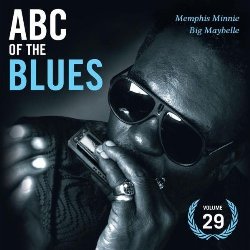ABC Of The Blues CD29 (2010)
ABC Of The Blues CD29 (2010)

CD29 - Memphis Minnie & Big Maybelle 29-01 Memphis Minnie – Frisco Town 29-02 Memphis Minnie – Moonshine 29-03 Memphis Minnie – Nothing in Rambling 29-04 Memphis Minnie – I’m Talking About You play 29-05 Memphis Minnie – Joe Louis Strut 29-06 Memphis Minnie – Me and My Chauffeur Blues 29-07 Memphis Minnie – My Baby Don’t Want Me No More 29-08 Memphis Minnie – Bumble Bee 29-09 Memphis Minnie – Boy Friend Blues 29-10 Memphis Minnie – In My Girlish Days 29-11 Big Maybelle – Gabbin’ Blues (Don’t Run My Business) 29-12 Big Maybelle – Rain Down Rain 29-13 Big Maybelle – Way Back Home 29-14 Big Maybelle – Please Stay Away from My Sam play 29-15 Big Maybelle – Jinny Mule 29-16 Big Maybelle – I’ve Got a Feelin’ 29-17 Big Maybelle – One Monkey Don’t Stop No Show 29-18 Big Maybelle – Hair Dressin’ Women 29-19 Big Maybelle – Don’t Leave Poor Me 29-20 Big Maybelle – No More Trouble out of Me
Memphis Minnie McCoy (June 3, 1897–August 6, 1973) was an American Blues musician.
Born Lizzie Douglas in Algiers, Louisiana, she was one of the most influential and pioneering female blues musicians and guitarists of all time. Minnie recorded for forty years, virtually unheard of for any woman in show business at the time, and possibly unique among female blues artists. A flamboyant character who wore bracelets made of silver dollars, she was the biggest female blues singer from the early Depression years through World War II. One of the first blues artists to take up the electric guitar, in 1942, she combined her Louisiana-country roots with Memphis-blues to produce her unique country-blues sound; along with Big Bill Broonzy and Tampa Red, she took country blues into electric urban blues, paving the highway for giants like Muddy Waters, Little Walter, and Jimmy Rogers to travel from the small towns of the south to the big cities of the north. She was married three times, and each husband was an accomplished blues guitarist: Joe McCoy (a.k.a. “Kansas Joe”) later of the Harlem Hamfats, Casey Bill Weldon of the Memphis Jug Band, and Ernest Lawlers (a.k.a. “Little Son Joe”).
After learning to play guitar and banjo as a child, at the age of thirteen she ran away from home to Memphis, Tennessee, playing guitar in nightclubs and on the street as Lizzie “Kid” Douglas. ---last.fm
Mabel Louise Smith (May 1, 1924 – January 23, 1972), known professionally as Big Maybelle, was an American R&B singer and pianist. Her 1956 hit single "Candy" received the Grammy Hall of Fame Award in 1999.
Born in Jackson, Tennessee, United States, Big Maybelle sang gospel as a child and by her teens had switched to rhythm and blues. She began her professional career with Dave Clark's Memphis Band in 1936, and also toured with the all female International Sweethearts of Rhythm. She then joined Christine Chatman's Orchestra as pianist, and made her first recordings with Chatman in 1944, and with the Tiny Bradshaw's Orchestra from 1947 to 1950.
Her debut solo recordings, as Mabel Smith, came for King Records in 1947, backed by Oran "Hot Lips" Page, but she had little initial success. However, in 1952 she was signed by Okeh Records, whose record producer Fred Mendelsohn gave her the stage name Big Maybelle. Her first recording for Okeh, "Gabbin' Blues", was a number 3 hit on the Billboard R&B chart, and was followed up by both "Way Back Home" and "My Country Man" in 1953. In 1955 she recorded "Whole Lotta Shakin' Goin On", produced by Quincy Jones, two years before Jerry Lee Lewis' version. More hits followed throughout the 1950s, mainly for Savoy Records, including "Candy" (1956), one of her biggest sellers.
She made the stage of the Apollo Theater in New York City; the 1958 Newport Jazz Festival; and she appeared in Jazz on a Summer's Day (1960), filmed at the Newport Jazz Festival, along with Mahalia Jackson and Dinah Washington. After 1959 she recorded for a variety of labels but the hits largely dried up. She continued to perform in person into the early 1960s, when drug addiction and health problems took their toll on her. Her last hit single was in 1967 with a cover of "96 Tears" by Question Mark & the Mysterians
Big Maybelle died in a diabetic coma in 1972, in Cleveland, Ohio.[1] Her final album, Last of Big Maybelle, was released posthumously in 1973.
The album The Okeh Sessions on the Epic label, won the 1983 W. C. Handy Award, for "Vintage or Reissue Album of the Year (U.S.)." In 2011, she was inducted to the Blues Hall of Fame.
download (mp3 @320 kbs):
yandex 4shared mediafire ulozto gett bayfiles
Last Updated (Tuesday, 20 August 2019 19:51)








